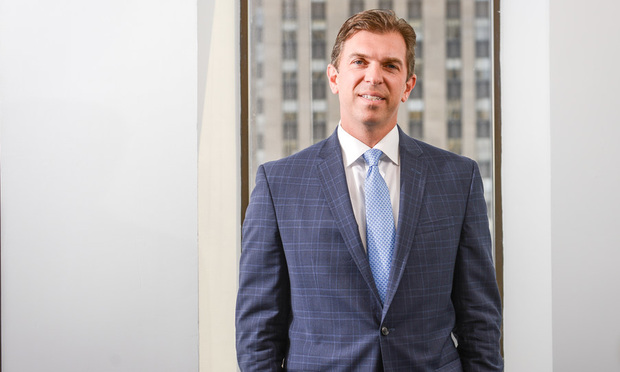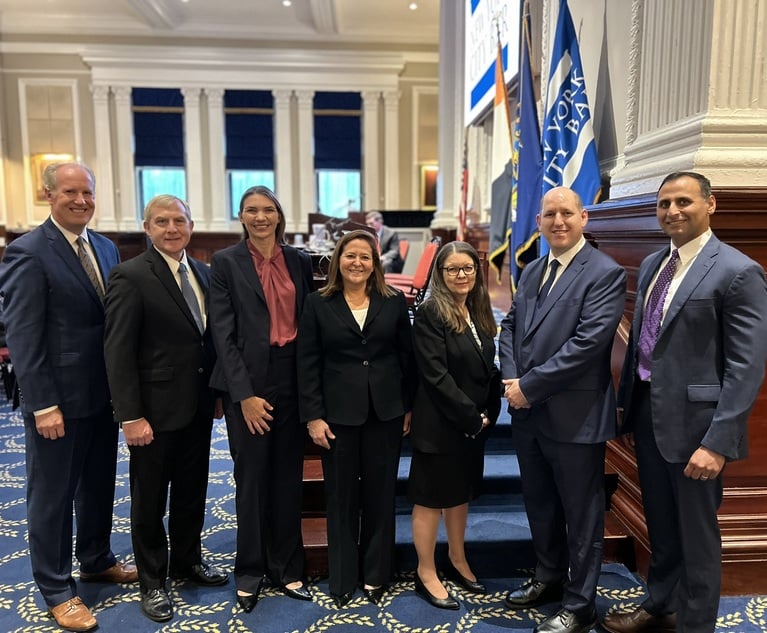Attorney of the Year Finalist: Mark Lebovitch
"The first day I was in court and I saw people get up to the podium and argue, I knew I was a litigator."
October 21, 2019 at 11:01 AM
7 minute read
 Mark Lebovitch, partner, Bernstein Litowitz Berger & Grossmann
Mark Lebovitch, partner, Bernstein Litowitz Berger & Grossmann
Mark Lebovitch wasn't planning to practice law any longer than it took to pay off his student loans, instead opting to leave the legal industry and pursue entrepreneurial work, like a tech company.
Plans change. Two decades later, Lebovitch helped launch—and now leads—the corporate governance litigation practice at Bernstein Litowitz Berger & Grossmann in Manhattan, where he's a partner.
"I was going to go to law school to learn how things work from a business perspective. I planned to join a big law firm as a corporate lawyer, learn more about the business end of things, and then leave," Lebovitch said. "I was going to pay off loans and try something entrepreneurial."
Lebovitch said he was going to take his chances working at an Internet start-up company, which were just starting to bloom when he graduated from NYU Law School in 1999. But then two things happened that changed his mind.
He took a class on corporate law with William Allen, the former chancellor of the Delaware Court of Chancery. That sparked his interest in the fiduciary responsibility that directors have to shareholders, Lebovitch said, and started him down the path to corporate governance litigation.
"I am fascinated by the whole concept of directors and officers managing a business that fundamentally belongs to shareholders, where the only thing that makes the whole system make sense are fiduciary duties," Lebovitch said. "Otherwise, directors could just misallocate investor money and do all sorts of things without consequence."
Lebovitch then clerked with Stephen Lamb, a former vice chancellor of the Delaware Court of Chancery. That's when his plan of working with an Internet start-up company was quickly replaced with a very different career track: litigating on behalf of investors.
"The first day I was in court and I saw people get up to the podium and argue, I knew I was a litigator," Lebovitch said. "I wanted to be a trial lawyer."
Years later, he's respected by many in the legal community. That includes Edward Rock, director of the Institute for Corporate Governance & Finance at NYU Law School. He actually met Lebovitch while teaching at the University of Pennsylvania Law School several years ago, but has admired his work since.
"He combines a really deep understanding of the law with the kind of scrappy determination that you need to have if you're going to be a successful plaintiff lawyer," Rock said.
If you ask Lebovitch if leading a corporate governance litigation practice at a major law firm was part of a broader plan for his career, he'll tell you it wasn't. He's never had a five- or 10-year plan, but he kept that entrepreneurial spirit alive when he joined Bernstein Litowitz Berger & Grossman in 2004.
A few years after starting at the firm, Lebovitch began to think about his work differently. He had started pursuing cases on behalf of investors and shareholders, but the firm didn't have a dedicated practice for that kind of litigation. He brought the idea to the firm's leaders, who he said were incredibly supportive.
"I believe there are all these advisors and big corporate defense firms whose job it is to pull the rope of corporate governance in favor of their clients, which are directors and officers," Lebovitch said. "I started to view ourselves as pulling back on the rope, setting the balance of corporate governance in order to really change practices and help investors generally."
His grip on that rope got a little tighter this year. Bernstein Litowitz Berger & Grossman announced in July that it was opening an office in Delaware, one of the most important jurisdictions for corporate governance litigation in the country. Lebovitch said opening the office is more than just starting a new chapter for the firm—it's like writing a new book.
"It's one thing to be a New York lawyer, who the Delaware community knows and may or may not think is any good at this," Lebovitch said. "It's another to really invest in the system and open up a Delaware office."
He doesn't expect the firm's practice to stop growing anytime soon. The Delaware office will be led by Greg Varallo, formerly of Richards Layton & Finger. Varallo had been an adversary of Lebovitch in court for a number of years, on several cases.
Now, they'll work together on the plaintiff side of the law, where Lebovitch has already had a series of high-profile wins for investors and shareholders.
"I think it's amazing," Lebovitch said. "I think we've achieved a lot in terms of financial recoveries for investors and moving the law."
His track record in recent years would support that claim.
Before the #MeToo movement emerged last year, Lebovitch led a case against the parent company of Fox News over persistent claims of sexual harassment and discrimination at the network. The litigation came after Fox News Host Gretchen Carlson sued Roger Ailes, the network's CEO, over claims of sexual harassment.
"Most people would not have thought, based on Delaware law, that you could sue a board for failing to restrain executives for engaging in sexual harassment," Lebovitch said.
Most people were wrong, as it turns out. The case resulted in a financial recovery of $90 million and the creation of the Fox News Workplace Professionalism and Inclusion Council. The council serves as an oversight panel, and has been used regularly as a model for other companies faced with similar systemic issues.
"We created a precedent that other companies are voluntarily implementing when they have problems," Lebovitch said. "That's gratifying."
Lebovitch has also led the charge against so-called "proxy put" provisions in corporate debt agreements, which essentially allow financial institutions to accelerate a company's debt if the members of its board change.
They've been used in the past by directors to argue against being voted from a company's board. Lebovitch challenged that practice in the Delaware Court of Chancery, which ruled that using debt acceleration as leverage to win a proxy fight is a breach of duty.
"That's another example of a practice that was extremely widespread," Lebovitch said. "We challenged it, and eventually the law recognized that these proxy puts are probably not enforceable and they shouldn't be an impediment to the voting rights of shareholders."
He also represented shareholders in a lawsuit against Yahoo! over the company's failure to disclose a major data breach in 2014, which they argued exposed the company to significant damages, investigations, and litigation. That ended with a $29 million recovery for investors.
"It was unclear that you could have a derivative claim against a board for allowing a data breach," Lebovitch said. "It was a serious data breach and one with national, global implications on it. Yahoo! did not respond the right way, so we sued them."
With his practice growing, Lebovitch is expected to take on similarly challenging and precedent-setting cases in the future. His only wish, aside from what he's doing now, is to pass that experience on to other lawyers entering the field, he said.
This content has been archived. It is available through our partners, LexisNexis® and Bloomberg Law.
To view this content, please continue to their sites.
Not a Lexis Subscriber?
Subscribe Now
Not a Bloomberg Law Subscriber?
Subscribe Now
NOT FOR REPRINT
© 2025 ALM Global, LLC, All Rights Reserved. Request academic re-use from www.copyright.com. All other uses, submit a request to [email protected]. For more information visit Asset & Logo Licensing.
You Might Like
View All
Elizabeth Cooper of Simpson Thacher on Building Teams in a 'Relationship Business'
4 minute read
For Paul Weiss, Progress Means 'Embracing the Uncomfortable Reality'
5 minute read
Kenneth Feinberg Had Dreams of Being on the Big Screen. His 9/11 Victims Fund Gave Him an Unexpected Star Turn

City Bar Holds 32nd Annual Henry L. Stimson Medal Presentation
Trending Stories
Who Got The Work
J. Brugh Lower of Gibbons has entered an appearance for industrial equipment supplier Devco Corporation in a pending trademark infringement lawsuit. The suit, accusing the defendant of selling knock-off Graco products, was filed Dec. 18 in New Jersey District Court by Rivkin Radler on behalf of Graco Inc. and Graco Minnesota. The case, assigned to U.S. District Judge Zahid N. Quraishi, is 3:24-cv-11294, Graco Inc. et al v. Devco Corporation.
Who Got The Work
Rebecca Maller-Stein and Kent A. Yalowitz of Arnold & Porter Kaye Scholer have entered their appearances for Hanaco Venture Capital and its executives, Lior Prosor and David Frankel, in a pending securities lawsuit. The action, filed on Dec. 24 in New York Southern District Court by Zell, Aron & Co. on behalf of Goldeneye Advisors, accuses the defendants of negligently and fraudulently managing the plaintiff's $1 million investment. The case, assigned to U.S. District Judge Vernon S. Broderick, is 1:24-cv-09918, Goldeneye Advisors, LLC v. Hanaco Venture Capital, Ltd. et al.
Who Got The Work
Attorneys from A&O Shearman has stepped in as defense counsel for Toronto-Dominion Bank and other defendants in a pending securities class action. The suit, filed Dec. 11 in New York Southern District Court by Bleichmar Fonti & Auld, accuses the defendants of concealing the bank's 'pervasive' deficiencies in regards to its compliance with the Bank Secrecy Act and the quality of its anti-money laundering controls. The case, assigned to U.S. District Judge Arun Subramanian, is 1:24-cv-09445, Gonzalez v. The Toronto-Dominion Bank et al.
Who Got The Work
Crown Castle International, a Pennsylvania company providing shared communications infrastructure, has turned to Luke D. Wolf of Gordon Rees Scully Mansukhani to fend off a pending breach-of-contract lawsuit. The court action, filed Nov. 25 in Michigan Eastern District Court by Hooper Hathaway PC on behalf of The Town Residences LLC, accuses Crown Castle of failing to transfer approximately $30,000 in utility payments from T-Mobile in breach of a roof-top lease and assignment agreement. The case, assigned to U.S. District Judge Susan K. Declercq, is 2:24-cv-13131, The Town Residences LLC v. T-Mobile US, Inc. et al.
Who Got The Work
Wilfred P. Coronato and Daniel M. Schwartz of McCarter & English have stepped in as defense counsel to Electrolux Home Products Inc. in a pending product liability lawsuit. The court action, filed Nov. 26 in New York Eastern District Court by Poulos Lopiccolo PC and Nagel Rice LLP on behalf of David Stern, alleges that the defendant's refrigerators’ drawers and shelving repeatedly break and fall apart within months after purchase. The case, assigned to U.S. District Judge Joan M. Azrack, is 2:24-cv-08204, Stern v. Electrolux Home Products, Inc.
Featured Firms
Law Offices of Gary Martin Hays & Associates, P.C.
(470) 294-1674
Law Offices of Mark E. Salomone
(857) 444-6468
Smith & Hassler
(713) 739-1250






